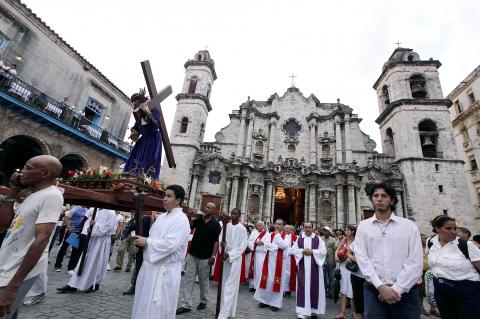Catholics in Cuba flocked to churches on Good Friday, which was declared a holiday in the communist-ruled nation for the first time following a request from Pope Benedict XVI during his recent visit.
Cardinal Jaime Ortega, the archbishop of Havana, led celebrations at the main cathedral in the capital — an event broadcast live on Cuban TV.
Among those in attendance were several members of the Ladies in White, the country’s most prominent dissident group, which is seeking the release of political prisoners.

Photo: Reuters
The Church played a key mediating role in the 2010 release of some prisoners.
“We are here to ask God to enlighten us, to protect us ... we will continue this peaceful struggle we have begun for the freedom of our loved ones, but also for a new Cuba,” the group’s leader, Berta Soler, told reporters.
There was also a procession planned between the cathedral and a shrine in Havana’s old city.
During his visit to Cuba last month, the pope asked Cuban President Raul Castro to declare Good Friday a holiday and appealed for an expansion of religious liberties in the country, the Americas’ only one-party communist state.
“It must be recognized with joy that in Cuba steps are currently being taken to enable the Church to undertake its indispensable mission to publicly and openly express its faith,” the pope said.
“However, it is necessary to move forward and I would encourage the nation’s government to strengthen what has already been achieved and advance along the path of authentic service for the mmon good of all Cuban society,” he added.
Catholic processions were suppressed in Cuba in 1961 and Christmas was banned in 1969. They were restored after the first papal visit to Cuba, by pope John Paul II in 1998.

Thousands gathered across New Zealand yesterday to celebrate the signing of the country’s founding document and some called for an end to government policies that critics say erode the rights promised to the indigenous Maori population. As the sun rose on the dawn service at Waitangi where the Treaty of Waitangi was first signed between the British Crown and Maori chiefs in 1840, some community leaders called on the government to honor promises made 185 years ago. The call was repeated at peaceful rallies that drew several hundred people later in the day. “This government is attacking tangata whenua [indigenous people] on all

RIGHTS FEARS: A protester said Beijing would use the embassy to catch and send Hong Kongers to China, while a lawmaker said Chinese agents had threatened Britons Hundreds of demonstrators on Saturday protested at a site earmarked for Beijing’s controversial new embassy in London over human rights and security concerns. The new embassy — if approved by the British government — would be the “biggest Chinese embassy in Europe,” one lawmaker said earlier. Protester Iona Boswell, a 40-year-old social worker, said there was “no need for a mega embassy here” and that she believed it would be used to facilitate the “harassment of dissidents.” China has for several years been trying to relocate its embassy, currently in the British capital’s upmarket Marylebone district, to the sprawling historic site in the

‘IMPOSSIBLE’: The authors of the study, which was published in an environment journal, said that the findings appeared grim, but that honesty is necessary for change Holding long-term global warming to 2°C — the fallback target of the Paris climate accord — is now “impossible,” according to a new analysis published by leading scientists. Led by renowned climatologist James Hansen, the paper appears in the journal Environment: Science and Policy for Sustainable Development and concludes that Earth’s climate is more sensitive to rising greenhouse gas emissions than previously thought. Compounding the crisis, Hansen and colleagues argued, is a recent decline in sunlight-blocking aerosol pollution from the shipping industry, which had been mitigating some of the warming. An ambitious climate change scenario outlined by the UN’s climate

A deluge of disinformation about a virus called hMPV is stoking anti-China sentiment across Asia and spurring unfounded concerns of renewed lockdowns, despite experts dismissing comparisons with the COVID-19 pandemic five years ago. Agence France-Presse’s fact-checkers have debunked a slew of social media posts about the usually non-fatal respiratory disease human metapneumovirus after cases rose in China. Many of these posts claimed that people were dying and that a national emergency had been declared. Garnering tens of thousands of views, some posts recycled old footage from China’s draconian lockdowns during the COVID-19 pandemic, which originated in the country in late